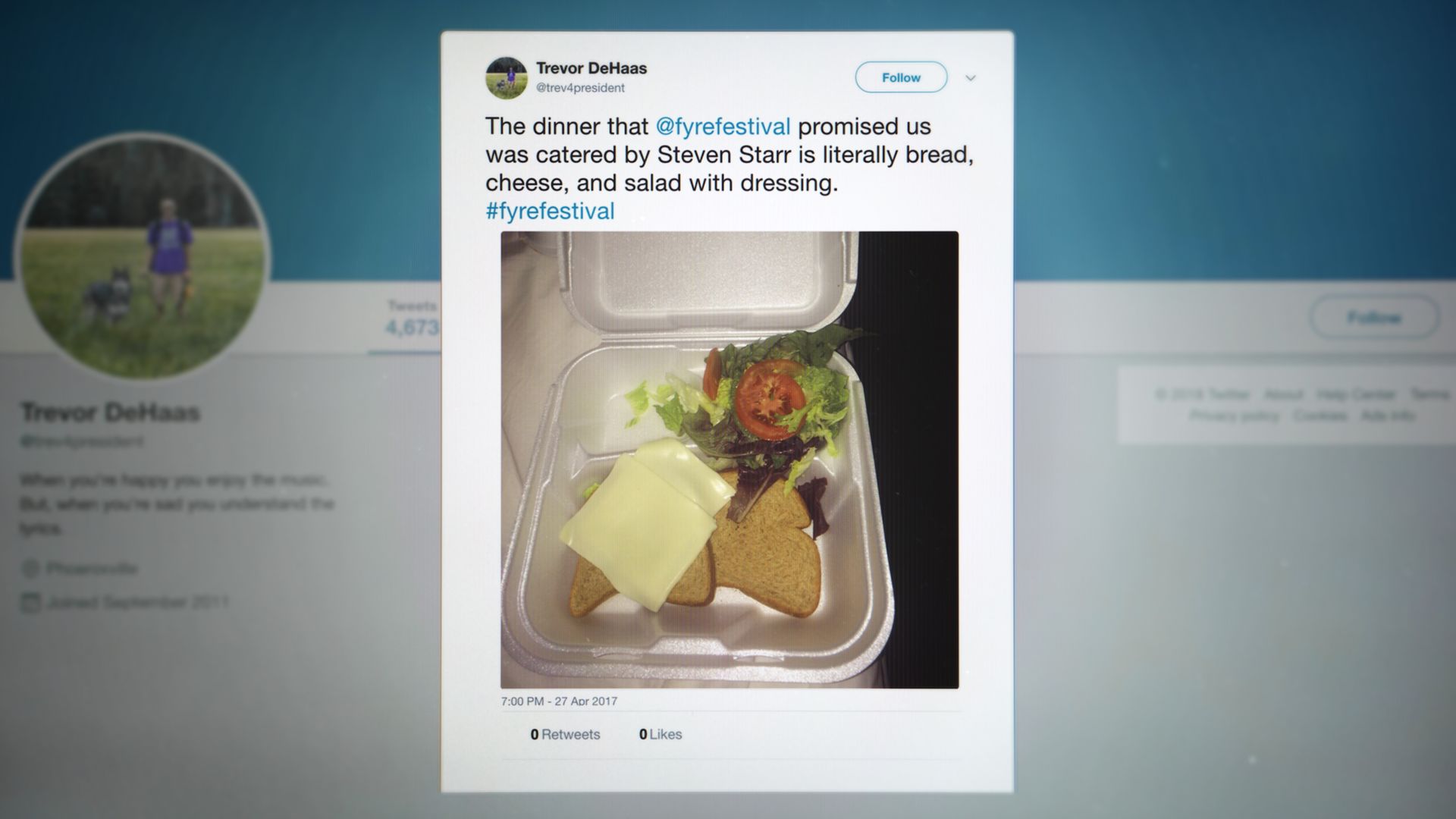Most people learned about the unprecedented fiasco that was Fyre Festival after a photo of a sad cheese sandwich went viral. This image of this so-called dinner distributed to ticket holders who’d paid top dollar for a premium music event was, indeed, emblematic of the hubris-driven hellscape of incompetence and fraud that greeted the attendees instead. But, as a hilarious (if also kind of upsetting) documentary coming to theaters and Netflix on Jan. 18 recounts in gory detail, the 2017 festival had been a disaster since the moment it was conceived, months earlier.
At the center of this wilder-than-fiction ride is Fyre’s mastermind: sweaty huckster Billy McFarland, a morbidly fascinating narcissist desperate to live the bro fantasy he’s selling. Organized in collaboration with rapper Ja Rule to promote the business partners’ live-music booking app, the event was hyped—in a video that found the pair lounging beachside with top models like Bella Hadid and Hailey Baldwin, plus a paid Instagram post from Kendall Jenner—as an exclusive luxury experience on a private island in the Bahamas. Headliners were set to include Migos, Blink-182, Rae Sremmurd and Diplo’s Major Lazer. Tickets started at $1500, with VIP options soaring into the tens of thousands. Thanks to that mammoth price tag, reliance on celebrity “influencers” and frat-party aesthetic, the festival was ripe for mockery even before its catastrophic failure. In delicious footage from the promo video shoot that appears in the film, also titled FYRE, an organizer articulates his own lack of respect for the target audience: “We’re selling a pipe dream to your average loser.”
Yet it was the execution of this plan, as documented in real time on social media—largely by the same influencers who’d been comped passes—that clinched Fyre’s legacy as one of the worst music festivals ever. After wearing out their welcome on the original island, McFarland and co. pivoted to a not-at-all-isolated beach in the Exumas. Advertised as high-end glamping structures, the lodgings turned out to be disaster-relief tents with mattresses soaked in rainwater. Transportation was a nightmare. Blink-182 dropped out at the last minute. The festival ended before it had even properly begun. McFarland was eventually arrested and is now serving a six-year sentence for wire fraud in connection with the event.

FYRE captures all of the above in jaw-dropping detail, following McFarland from his origin story as the founder of a company that combined metal credit cards (really) with the lifestyle perks of a social club for millennials through a final ticket scam he ran while waiting to be sentenced. Director Chris Smith (Jim & Andy, American Movie) tends to let his subjects reveal themselves without distracting stylistic flourishes—an approach that’s ideally suited to the Fyre story. Unsurprisingly, McFarland isn’t interviewed in the doc, but archival footage and astounding accounts from employees and vendors form a pretty evocative composite portrait. At one point, pressed for funds, he invents a cashless payment wristband for the festival and instructs his minions to pressure ticket holders into loading them up with money spend on the island. Eerily unconcerned about the fallout of his constant deceptions, McFarland makes a pretty compelling villain.
That most supporting characters come off as merely naive, misinformed or loyal to a fault may have something to do with the forces behind the film. Vice Studios and Library Films produced FYRE with Jerry Media and Matte Projects, two ad agencies hired to help promote the festival—whose employees use their interviews, in part, to extricate their own reputations from the debacle. If McFarland’s young staffers, some of whom got stuck with his unpaid expenses, evoke real sympathy, it’s hard to extend the same to the experienced event planners who hung on for a paycheck. Hulu surprise-released its own Fyre doc, FYRE FRAUD, on the morning of Jan. 14, and it will be interesting to see how that version of the story diverges from this one. But I can’t complain too much about conflicts of interest when the insider participants provide such priceless footage.
Many viewers will surely tune in for the low-hanging laughs, and I won’t pretend anything more noble than the prospect of seeing finance guys and YouTube vloggers throw down over porta-potties drew me to the movie, either. But there’s more going on in FYRE than black comedy. There are undertones of postcolonial exploitation in the revelation that uncompensated Bahamian vendors were left on the hook for on-site workers’ pay. The apparent ease with which McFarland duped so many professionals (most of them white men) into helping him defraud thousands of “average losers” (also mostly white men, judging by festival footage) is a depressing indictment on a festival industry in which images of scantily clad models gyrating against Instagrammable sunsets are presumed to be a better investment than good music.
Most of all, FYRE left me thinking about Harmony Korine’s 2012 film Spring Breakers, a feverish travelogue of four fresh-faced college girls who hold up a diner to fund a Florida beach vacation worthy of MTV. So thirsty are they to live the decadent, materialistic music-video lifestyle pop culture has sold them that they end up abandoning their futures to become violent criminals. What’s most haunting about the movie isn’t the transformation itself so much as the emptiness of the desires that fuel it—essentially the same empty desires that both propelled McFarland and destroyed him.
More Must-Reads from TIME
- Donald Trump Is TIME's 2024 Person of the Year
- Why We Chose Trump as Person of the Year
- Is Intermittent Fasting Good or Bad for You?
- The 100 Must-Read Books of 2024
- The 20 Best Christmas TV Episodes
- Column: If Optimism Feels Ridiculous Now, Try Hope
- The Future of Climate Action Is Trade Policy
- Merle Bombardieri Is Helping People Make the Baby Decision
Contact us at letters@time.com